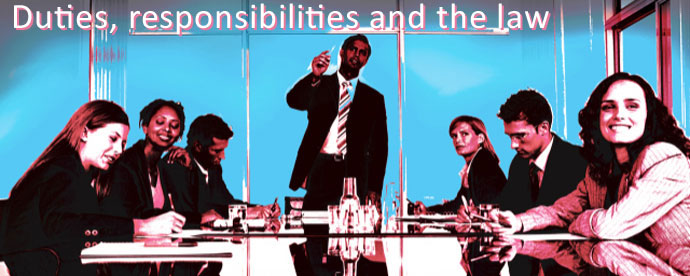
Day Two of the Company Directors Course was about the duties and responsibilities of Directors, and the legal environment. It was a drier day in many respects than day one, not only because the wintry rain abated. Much of the day was spent delving into such matters as the fiduciary duties of directors, recent test cases such as AWA (1992) and James Hardie (2012) and the complex issue of contract law, privacy and the rest …
It’s not for nothing that many boards require or expect Directors to have done the AICD’s company directors course. As I work my way through it, the mind boggling array of detail and complexity that a single director and board can get into only makes the point that no one should treat lightly onto any Board of any description. The undertaking is a major one, and gets more and more complex and risky the larger and more public the company. ‘I did not know‘ is no defence. Nor is ‘someone did not tell me‘. Anything that happens in the company can impact back on its Directors, for it is they that the shareholders have entrusted the power of overview and governance in the first place. It is they that carry the ultimate responsibility and where the buck stops. The ‘company’, albeit a separate entity, is not a person and cannot make decisions, but people can, and the people who have ultimate control are the Directors. Everyone in the company essentially works at their behest.
Having said that, a Director acting in good conscience, honestly and dutifully, who is well informed and asks reasonable questions, is well prepared, attends and is involved, should not have any issues and may very well have a long and distinguished board career. It’s not that businesses go down, many do, it’s that a ‘hypothetical reasonable person‘ parachuted into that same board seat would have done everything they could have done (within reason) to know what was going on, and make informed decisions. Did you?
Here are my takeaways from day 2 on the subjects of the duties/responsibilities of Directors and the legal environment in which they operate:
- There is common law and statutory law – common law is what is laid down by a judge from a court judgement, and as such sets precedents. Statutory law is pronounced through Acts of Parliament, and as such gives bodies like ASIC the powers to prosecute and attach penalties on companies. Both laws work side by side.
- Directors have a fiduciary duty, meaning their duties are owed to the company itself and mainly revolve about being honest, trustworthy, careful, diligent and acting in good faith.
- The Directors duty is to the company, and not one single group of stakeholders. ‘What is best for the company?’ should be in the forefront of their minds as they deliberate.
- Sometimes one group’s rights get ahead of the queue – for example, if the company is insolvent (cannot pay its immediate bills) then satisfying creditors becomes the most important concern. Once they are sorted, then the company may be able to continue trading (and as such, directors have the done the right thing by the company – shareholders, staff, and others may continue to benefit).
- Sometimes ‘shadow directors’ can be determined to be directors: for example, a consultant may sit on board meetings, give advice, and their deeds and actions may determine what a company ends up doing, bringing action back to that consultant if so deemed. Consultants are not automatically shadow directors, but in some cases act as if they are directors, and so could find themselves being treated as a director by the courts.
- To ‘act in good faith’ essentially means you have no conflict of interest (you, or a friend/family do not personally benefit from a decision the board deliberates on) and do not improperly use the information available to you as a Director (such as trading its shares – as Steve Vizard was alleged to have done while on the board of Telstra… which also begs the question, what was Steve Vizard, comedian, late night TV host, doing on the board of Telstra?!)
- A director should ask questions, be knowledgeable, have a well developed world view and exercise judgement.
- The ‘business judgement rule‘ absolves directors if they have taken decisions with the available facts and fully thought through their strategies in a planned, methodical, well documented manner. As mentioned, sometimes things go wrong, the main point is – would your decision look good in 10 minutes time, or 10 days, or 10 years? Would it look good if discussed in an article in Business News?
- Trading while insolvent is illegal. If directors suspect the company is near or in (or likely to be in) an insolvent position (i.e. not able to pay its bills as they fall) then the company should not continue to ‘trade out of the situation’ hence incurring more costs and possible debts. The directors could be held personally liable for those increases in costs/debts, plus other penalties including prison.
- An important recent case involves the collapse of Centro Property Group, where a long term liability (debt due to be repaid in more than 12 months) had not been rolled over and hence became a current liability (due within 12 months) post balance date. The directors either did not notice (or bother with) the potential problem should this liability not be rolled over for another year. When the banks took a tougher line and refused roll it over (as the GFC unfolded), it became an immediate debt and the company did not have enough immediate funds to meet the demand. It was $1.5 billion and not a trivial matter. Collapse ensued. 8 directors were held to have breached their duties. The directors should have asked the right question – what happens if this is not rolled over? what’s the likelihood? what’s the contingency? has anything changed (such as the GFC!)?
- Directors and Officers (D+O) insurance will reduce risk for directors (and help defray legal fees), but not if they have acted improperly. Nothing protects you against that. D+O insurance is best kept for up to 7 years after a director leaves the board, as the statute of limitations is that long.
- Reputational damage can be immense should a company breach a law. Good reputations help companies attract and retain the best people, help build a strong brand which can provide long term value.
- Reputations can be dashed through PR disasters such as last year’s VW emissions scandal or the BP Deep Horizon oil spill of 2010.
- Contract law is fraught with complications, and boards should review all standard contracts and have clear policies around who can agree to what and how much.
- IP law, competition and consumer law, privacy law, work health and safety law, environmental law and anti-discrimination law all impacts on companies.
- Directors have to be ahead of the game on the legal environment, state and federal, and have all the information they need to make reasonable decisions and ensure they are ‘more than’ complying with all the relevant laws in all the jurisdictions in which they operate.




[…] more to add to those already posted about the board’s responsibilities and decision-making, duties and the law, risk and strategy and accounts, solvency and […]